The 2020 election paints a stark reminder of the impact of gerrymandering on voter choice and representation at the state level.
Our state house has been ranked by Ballotpedia as fifth-worst state for competitive races in the 2020 election. In Illinois, 62 out of 138 races are uncontested. There are 10 out of 20 uncontested races in the state Senate and 52 out of 118 in the House. That means almost half of the people serving in state government will represent Illinoisans, not because they were elected and had to present their policy ideas to voters through debate and outreach, but because they submitted the proper forms to the Illinois State Board of Elections. This is not a new trend. Since 2012, the percentage of uncontested seats in Illinois has been as high as 58 percent, twice.
This lack of competition occurs, in no small way, because of partisan gerrymandering. Legislators draw the districts behind closed doors using data on people’s voting patterns: They know who votes for Democrats and who votes for Republicans. The political party in control of mapmaking draws the maps to ensure that there is a majority of a certain party’s voters in one district, thereby ensuring that party’s victory in the district. Since one party is practically guaranteed a victory, why would candidates from the other party bother to run?
What this means is that nearly half of the Illinois candidates don’t have to fight for the vote of Illinoisans. They don’t have to take the time to create an effective policy agenda that meets the needs of their district, or even listen to their constituents or potential voters. Instead, they can simply slide into victory, a seat in the statehouse, a salary and a full pension at the expense of Illinois taxpayers for little more than allegiance to the policies and priorities of their party’s leadership. This is not how the system is supposed to work.
What are the most important issues to you? Do you want better ethics laws in state government? Do you want to see more consolidation of governments? Property tax relief? Do you want fewer barriers for you and your neighbors to vote? If you feel as though those issues largely are being ignored, there’s a good chance that’s because your state representative and senator didn’t have to compete to win your vote. Because of partisan gerrymandering, your community’s needs could go unanswered for years.
The Illinois Legislature barely met to work this spring because of the pandemic. As a result, there wasn’t even a chance for debate or action and the deadline was missed for a Fair Maps constitutional amendment that would have allowed you to vote on whether you want an independent non-partisan commission to draw state and congressional maps rather than political party leaders. That commission would have been required to fully adhere to and honor protections for minorities enshrined in the state and federal voting rights acts.
However, hope for a transparent mapping process after the 2020 census is not lost entirely. Still, Illinoisans must demand that their state representatives and state senators thoughtfully incorporate community input in the upcoming remapping process. Our elections should be competitive and allow for our officials to be accountable to voters, not a process that is designed to shut out our voices.
After the remap, every state Senate and House seat will be up for re-election and we cannot afford to go another decade where half of our representation is predetermined before we have the opportunity to vote.
